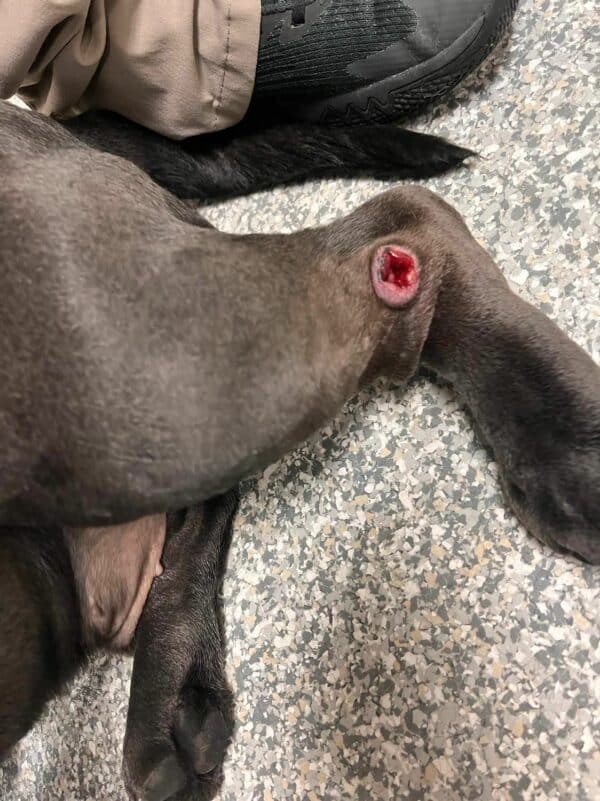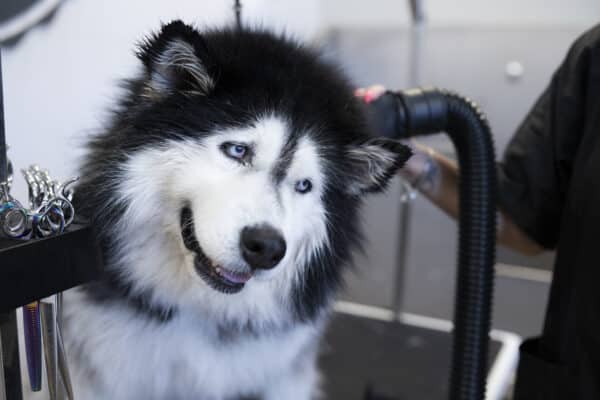For most pet owners, occasional tummy troubles are just a part of life with a canine. Sometimes, the cause of your four-legged friend’s stomach distress is obvious — like when he snatches some of your dinner. But if your pet is exhibiting symptoms of stomach distress without an apparent cause, there’s a chance he could be suffering from a more elusive condition known as inflammatory bowel disease (IBD). So, what is inflammatory bowel disease in dogs?
First, What is Inflammatory Bowel Disease in Dogs?

According to Dr. Dawn M. Spangler, assistant professor of shelter medicine at Lincoln Memorial University College of Veterinary Medicine, inflammatory bowel disease in dogs is a condition that causes inflammation of the intestinal lining, and can lead to intermittent symptoms such as vomiting, diarrhea and weight loss. “It’s a common disease that some breeds are predisposed to, such as German Shepherd Dogs, Boxers and French Bulldogs … and it’s also commonly seen in mixed breed dogs,” she explains.
What Are the Symptoms of Inflammatory Bowel Disease in Dogs?
Dr. Hyunmin Kim, veterinary staff manager for ASPCA Community Medicine, notes that the symptoms of inflammatory bowel disease in dogs can vary depending on which segment of the intestine is affected. If it’s related to an issue with your pet’s large intestine, he or she will typically display symptoms such as chronic diarrhea (which can be mucoid or bloody), flatulence, occasional vomiting and abdominal discomfort. In the small intestine, the symptoms are associated with a decreased appetite, weight loss, lethargy, poor body condition, poor hair coat and abdominal discomfort.
“Inflammatory bowel disease will lead to poor nutrient absorption, and therefore weight loss and an inability of all of the body’s cells to function normally,” she warns.
Causes of Inflammatory Bowel Disease in Dogs
But what exactly causes inflammatory bowel disease in dogs? According to Dr. Spangler, the causes can range from infectious or dietary agents to genetic factors. And, unlike many other gastrointestinal conditions in our furry friends, inflammatory bowel disease in dogs is unfortunately not a preventable disease. “IBD is not usually preventable,” she explains, “but it can be successfully managed once it’s definitely diagnosed and treated appropriately by a veterinarian.”
Inflammatory bowel disease in dogs, by its definition, involves an animal’s inflammatory response to chronic irritation of the stomach or intestines, adds Dr. Heidi Houchen, an emergency/critical care veterinarian for VCA Northwest Veterinary Specialists. “While the causes of IBD are poorly understood, it’s known that it involves interactions that occur between an animal’s immune system, the microbes that live in their intestinal tract, their genetic makeup, what they eat and how they live [that] triggers inflammation,” she says.
As each individual dog’s body responds to what it perceives as a threat, different types of inflammatory cells invade the lining of the stomach and the intestine. If this response to a perceived threat — which can be food allergens, bacterial proteins or intestinal parasites — persists, the immune system continues to produce these cells … which unfortunately can lead to permanent damage and scarring of the lining of the gastrointestinal tract.
“While the exact cause of IBD is unknown, it’s widely considered to be a result of the immune system’s response. It may react abnormally with normal intestinal microflora, or there may be antigens which penetrate the lining of the intestine and lead to an uncontrolled immune response,” Dr. Kim adds.
Diagnosing Inflammatory Bowel Disease in Dogs
To diagnose inflammatory bowel disease in dogs, Dr. Spangler says your veterinarian will likely conduct an intestinal biopsy, either with an endoscope or abdominal exploratory.
“Diagnosis of IBD usually requires a full thickness endoscopic biopsy. Most veterinarians will first obtain an initial database, which may include a blood test, fecal parasitology, abdominal radiographs and abdominal ultrasound to help rule out other causes,” Dr. Kim says.
Treating Inflammatory Bowel Disease in Dogs
Treatment of inflammatory bowel disease in dogs depends on the cause, but may include anti-inflammatories, antibiotics or dietary trials. The treatment revolves around immune suppression with glucocorticoids, or in severe cases, an immunosuppressant. Many veterinarians will also recommend an elimination diet with novel proteins or hydrolyzed peptides.
“A novel protein diet consists of a single protein that your pet has never been exposed to, while a hydrolyzed protein diet consists of low molecular weight peptides that are highly digestible and too small to trigger an immune response,” she explains.
Dr. Houchen adds that in addition to therapeutic diets, your veterinarian may also prescribe dietary supplements, such as probiotics. If your vet finds bacterial overgrowth or parasites in your pet’s test results, they may prescribe antibiotics or parasiticides. “Looking at studies of canines with chronic GI signs and IBD, 50 percent of these dogs had a positive response to dietary changes,” she says. If a dog is not responding to dietary and other supportive therapy, veterinarians often prescribe immune-modulating drugs.
Plus, could herbs help IBD in dogs? Find out more >>
What is the Prognosis for Inflammatory Bowel Disease in Dogs?
Fortunately, the short-term prognosis for mild cases of inflammatory bowel disease in dogs are good, Dr. Kim notes. The bad news is that symptoms associated with inflammatory bowel disease in dogs can mimic other acute life-threatening issues, such as a foreign body in your dog’s system. “Pet owners should always seek veterinary care if they see an intermittent or chronic pattern of vomiting and diarrhea … or any time they are concerned about their pet,” Dr. Kim says.
Read more about dog health and care on Dogster.com:
- Dogs in Heat: 9 Things to Know
- Home Treatment for a Dog Abscess — If It’s a Visible Skin Abscess
- What Are the Causes of Black Dog Poop?
Featured Image Credit: alex_ugalek | iStock / Getty Images Plus.





